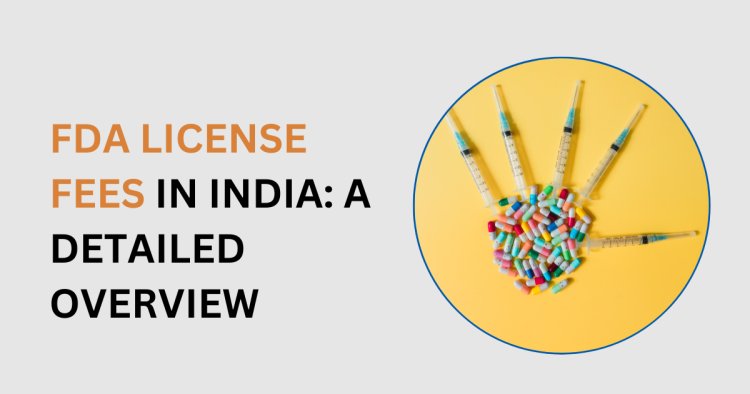FDA License Fees in India: A Detailed Overview
In India, the term "FDA" often refers to the Food and Drug Administration (FDA) at the state level. These state-level FDAs are responsible for regulating the food, drug, and cosmetic industries within their respective jurisdictions.
Share this Post to earn Money ( Upto ₹100 per 1000 Views )

What is FDA License?
In India, the term "FDA" often refers to the Food and Drug Administration (FDA) at the state level. These state-level FDAs are responsible for regulating the food, drug, and cosmetic industries within their respective jurisdictions. Obtaining an FDA license is mandatory for businesses involved in manufacturing, distributing, or selling these products.
Types of FDA Licenses and Associated Fees
The types of FDA licenses and their associated fees vary significantly depending on:
- Product Category: Food, drugs, cosmetics, medical devices
- Type of Business: Manufacturer, distributor, retailer
- State Regulations: Each state has its own fee structure and licensing requirements
Common Types of Licenses and Fee Considerations:
-
Food Manufacturing License:
- Purpose: To manufacture, process, or package food products.
- Fees: Highly variable based on factors like:
- Scale of operations (small-scale vs. large-scale)
- Product category (e.g., dairy, meat, confectionery)
- Specific requirements of the state FDA
- Drug Manufacturing License:
- Purpose: To manufacture, distribute, or sell drugs and pharmaceuticals.
- Fees: Generally higher due to the stringent regulations and safety concerns associated with pharmaceuticals.
- Factors influencing fees:
- Manufacturing capacity
- Drug categories (prescription, over-the-counter)
- Compliance with Good Manufacturing Practices (GMP)
- Cosmetic Manufacturing License:
- Purpose: To manufacture, distribute, or sell cosmetics.
- Fees: Typically lower than drug licenses but can vary based on product type and manufacturing scale.
- Food Business Operator (FBO) License:
- Purpose: For businesses involved in food handling, storage, and distribution (e.g., restaurants, supermarkets).
- Fees: Relatively lower, often determined by the type of food business and its location.
How to Get FDA Certificate in India
- Getting an FDA certificate usually entails the following steps:
- Application Submission: Submitting the necessary application forms and documents to the concerned state FDA office.
- Inspection: On-site inspections of the manufacturing facility to assess compliance with safety and hygiene standards.
- License Issuance: Upon successful completion of the application process and inspection, the FDA issues the license.
FDA Certificate Cost in India
-
FDA certificate cost can range from a few thousand rupees to several lakhs depending on the factors mentioned above.
- It's crucial to consult with the specific state FDA office or seek guidance from industry experts for accurate fee information.
Who distributes the drug to the wholesaler?
Drugs are distributed to wholesalers by pharmaceutical producers.
Here's a simplified breakdown of the pharmaceutical supply chain:
- Manufacturing
- Distribution
- Wholesale Distribution
Benefits of a Wholesale Food and Drug License
Businesses engaged in the distribution of food and medications must have a wholesale food and drug licence. Here are a few main advantages:
1. Legal Compliance
2. Enhanced Credibility and Trust
3. Improved Business Operations
4. Ensures Product Safety and Quality
5. Facilitates Business Growth
Final Thought
A crucial first step for businesses in India's food, pharmaceutical, and cosmetic sectors is acquiring an FDA license. It is essential to understand the licence requirements, fees, and application process for compliance and effective operations. Companies may contribute to a more secure and reliable market for consumers by following all regulations and completing the licensing procedure correctly.
















